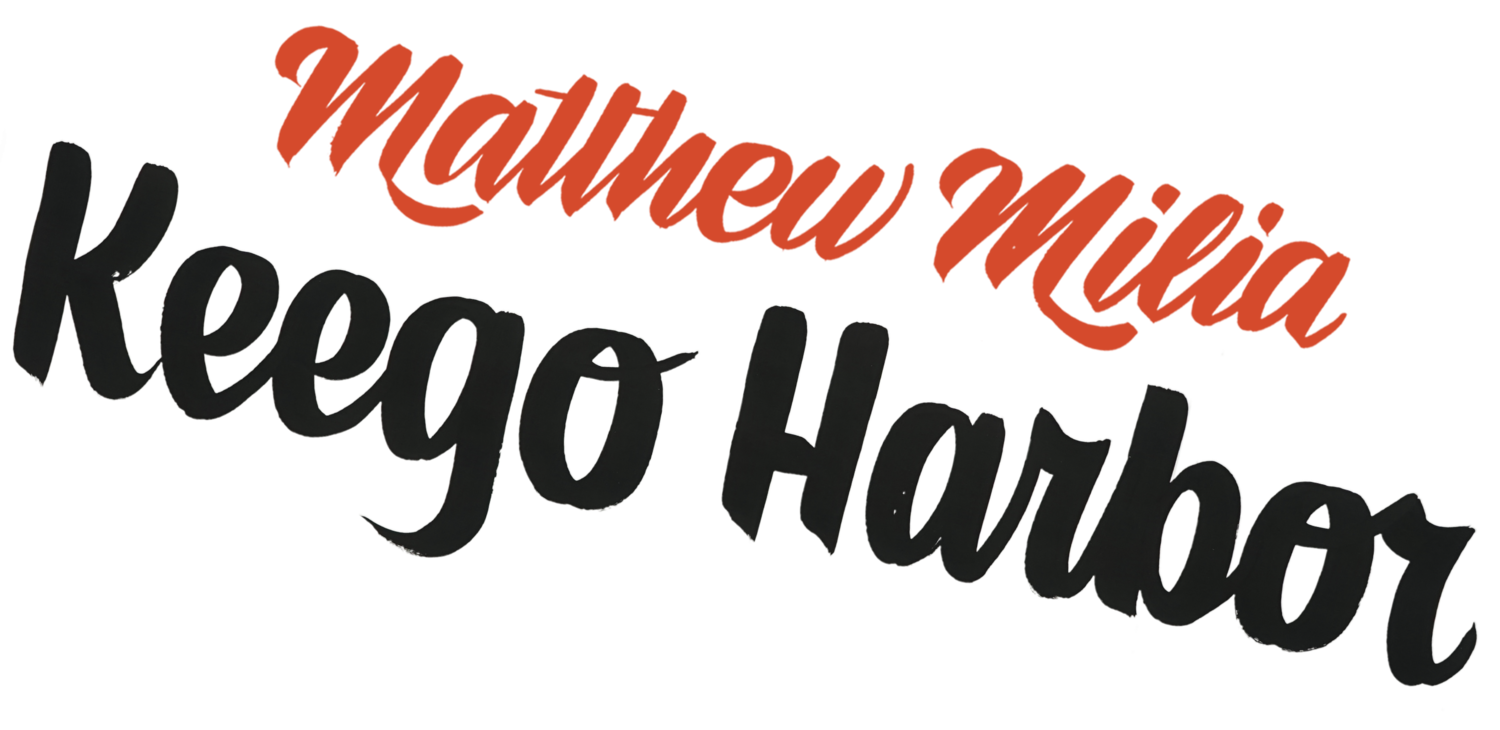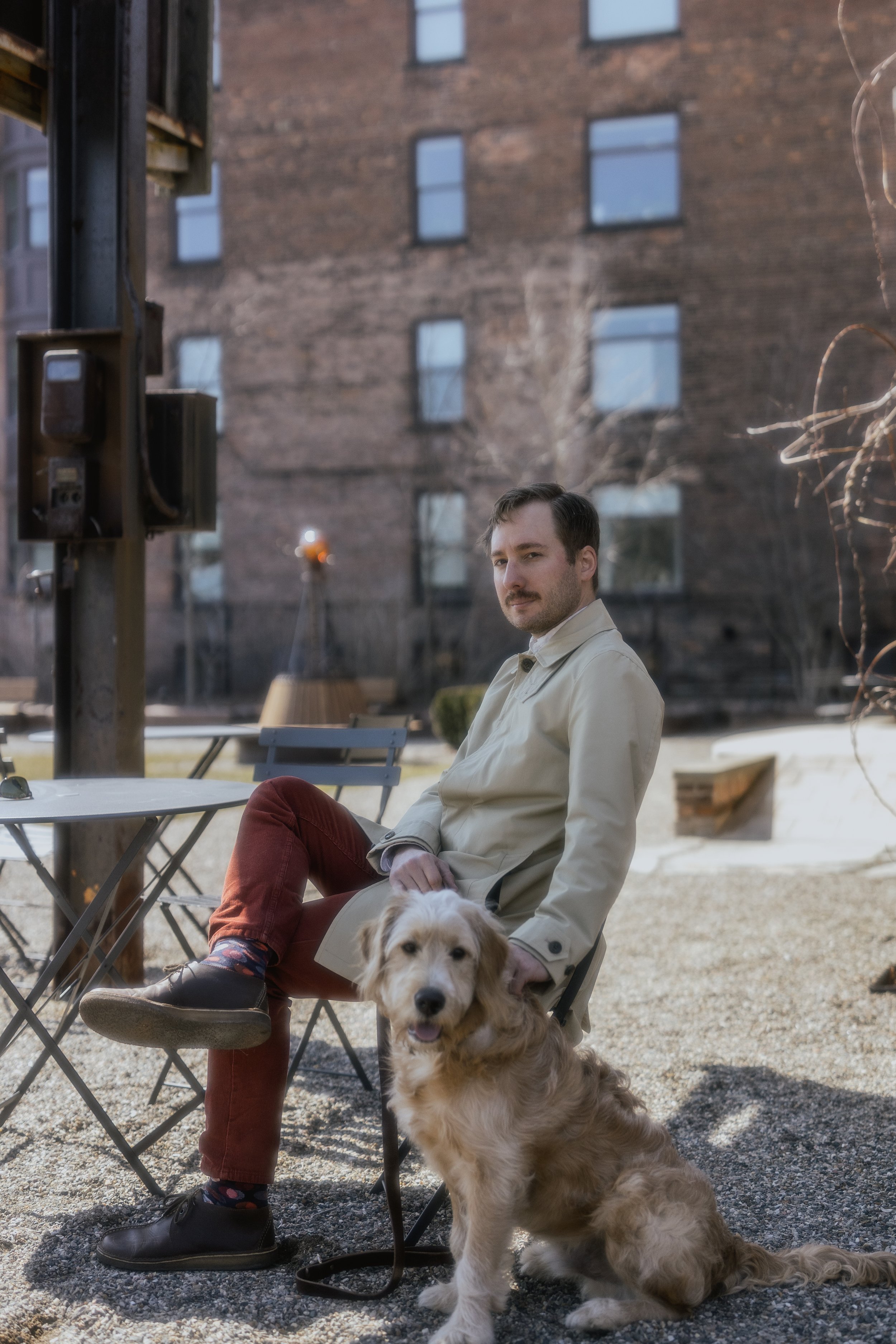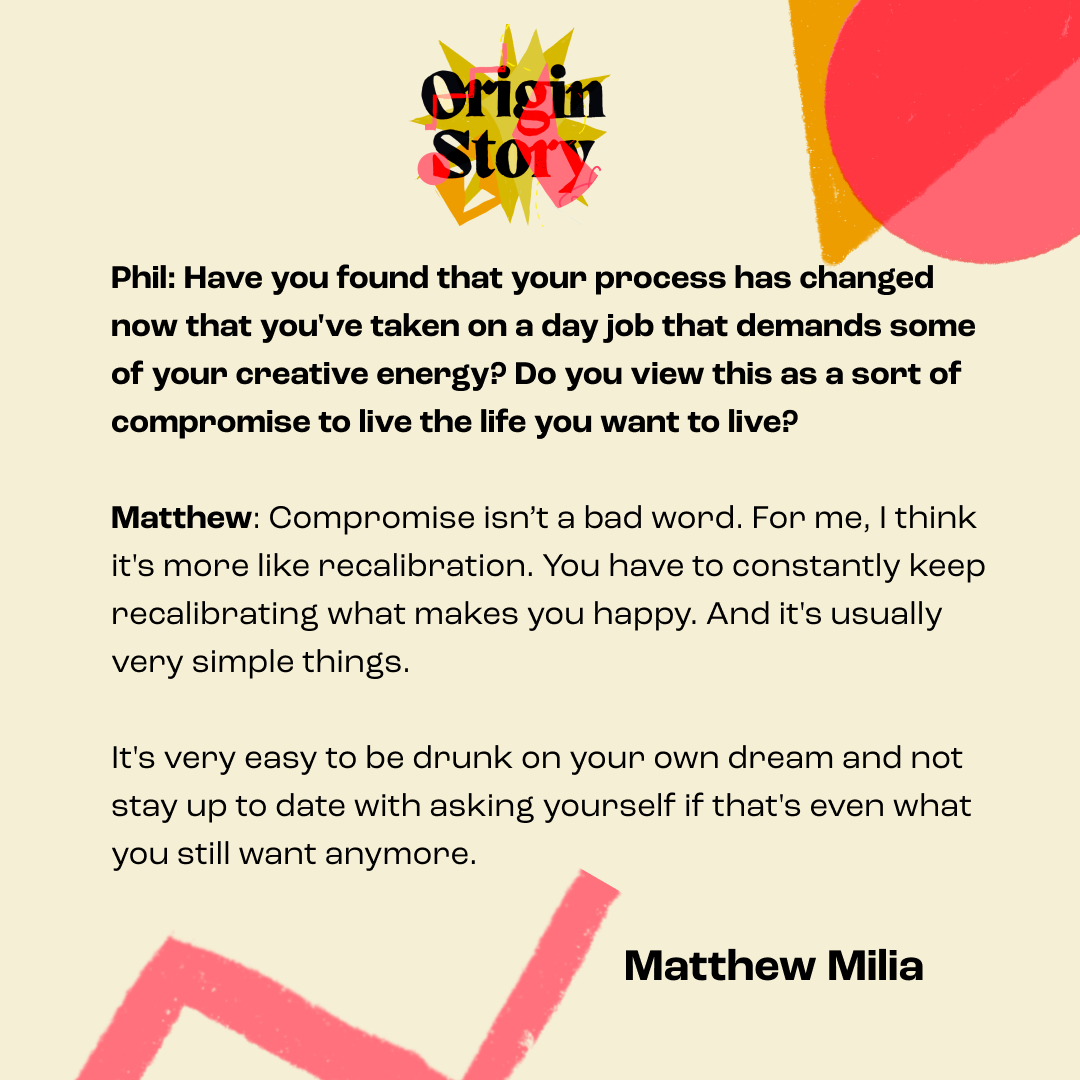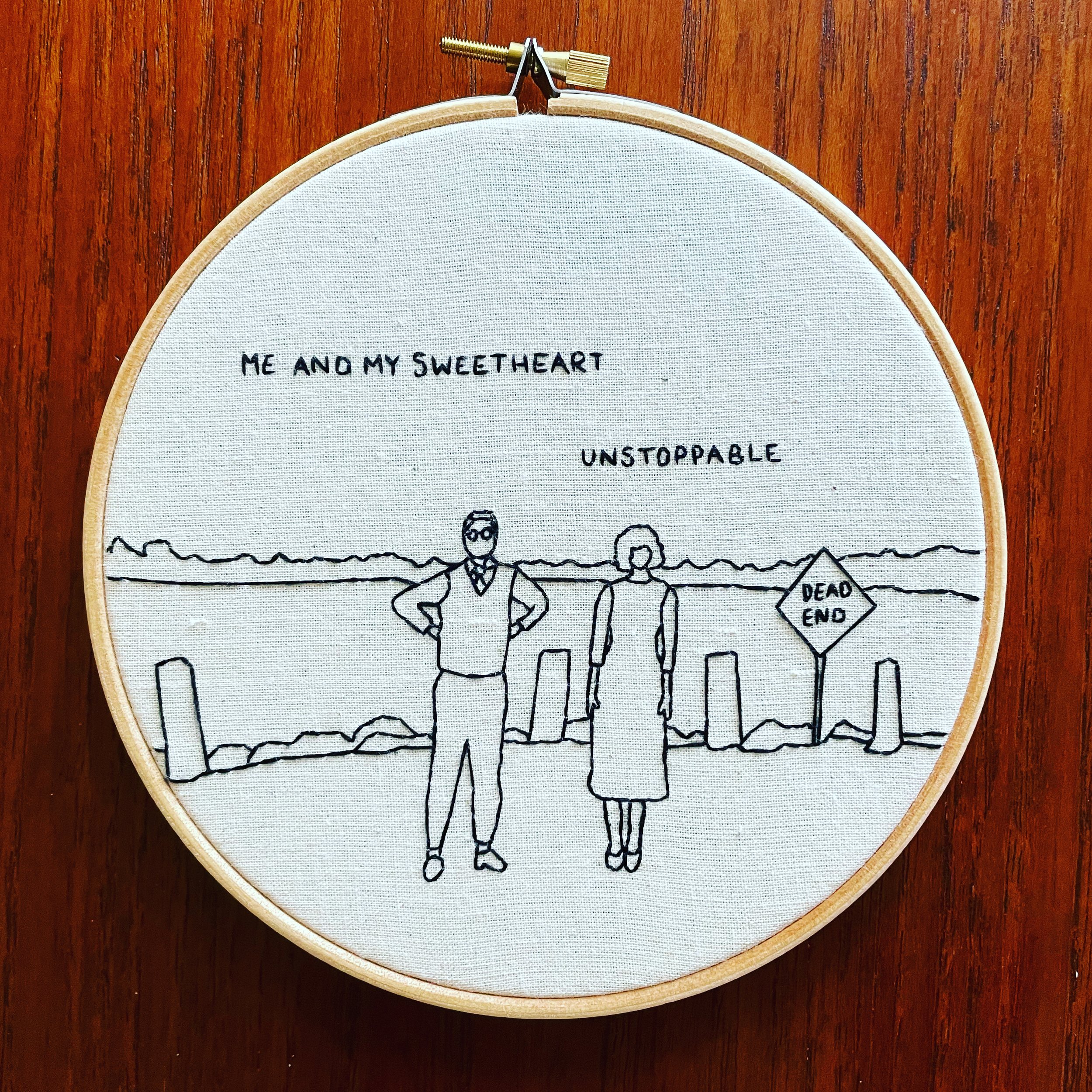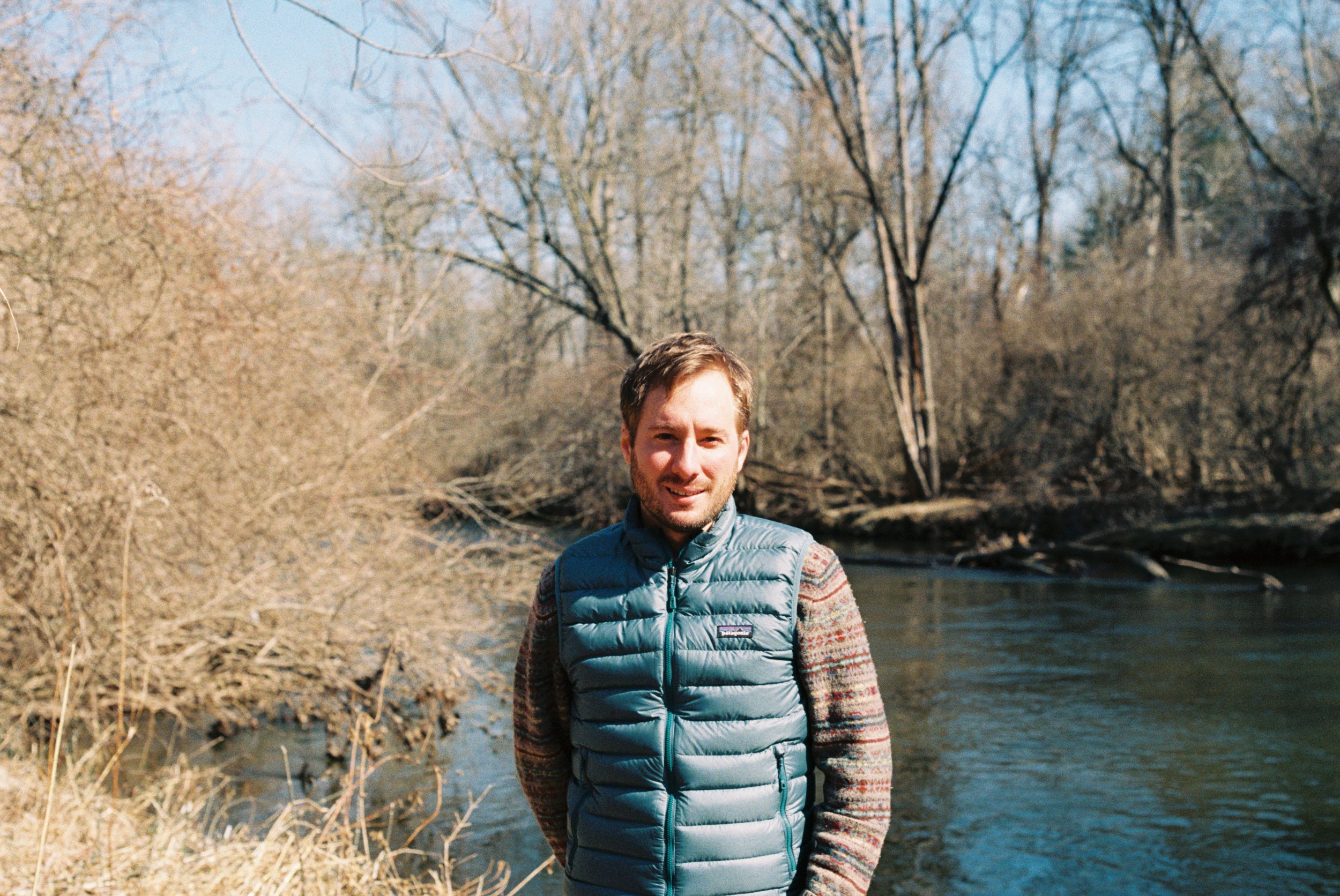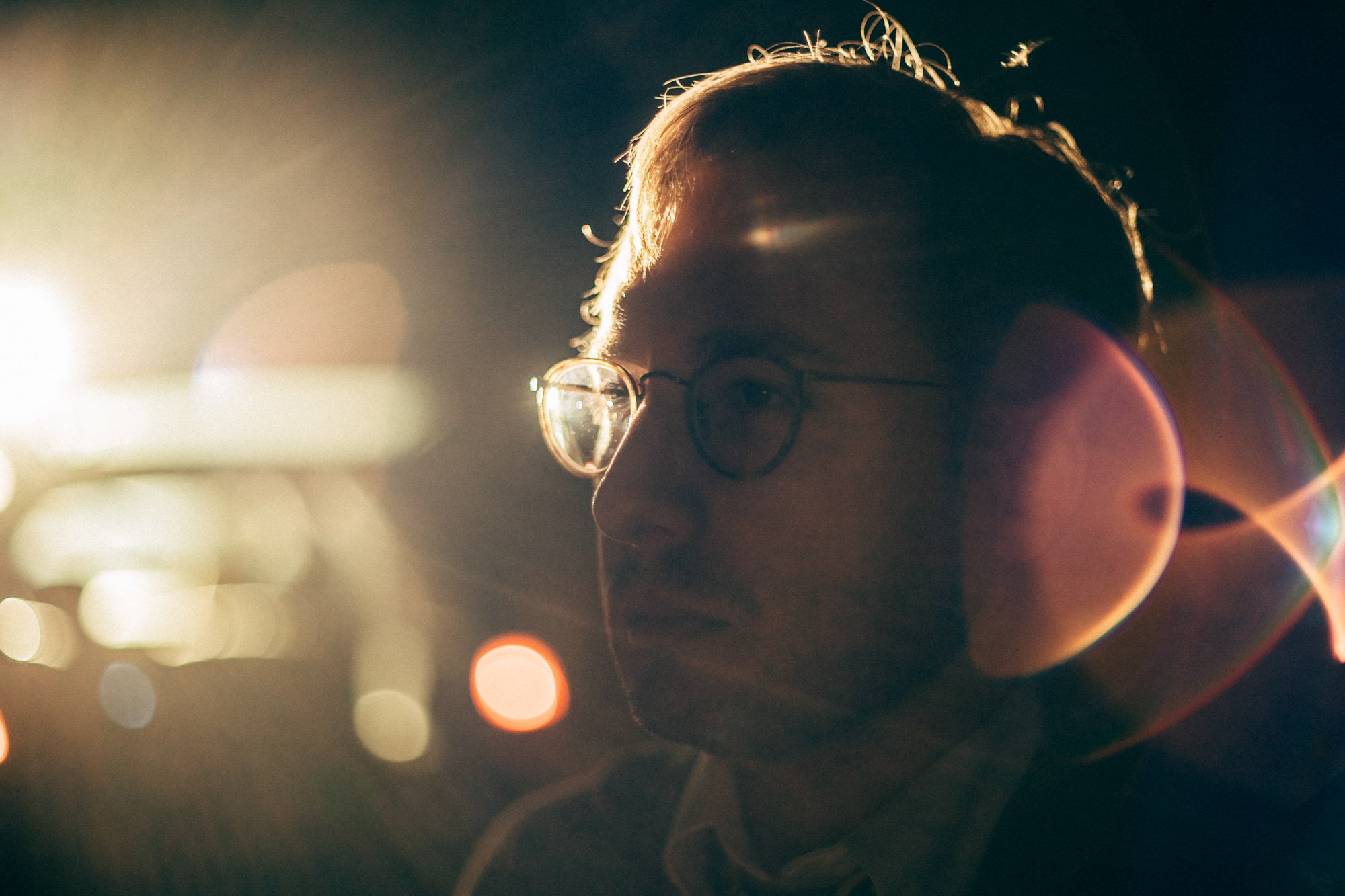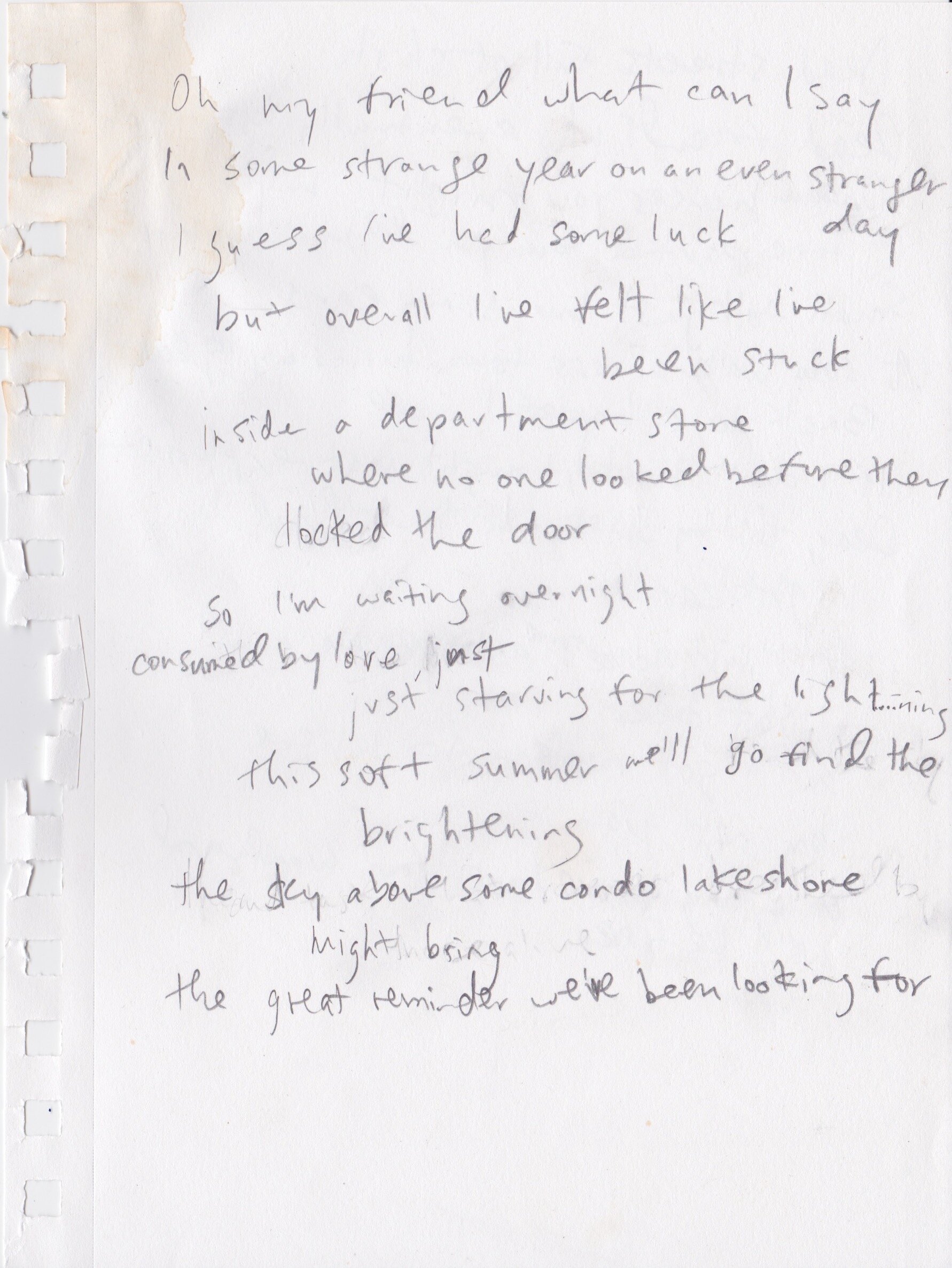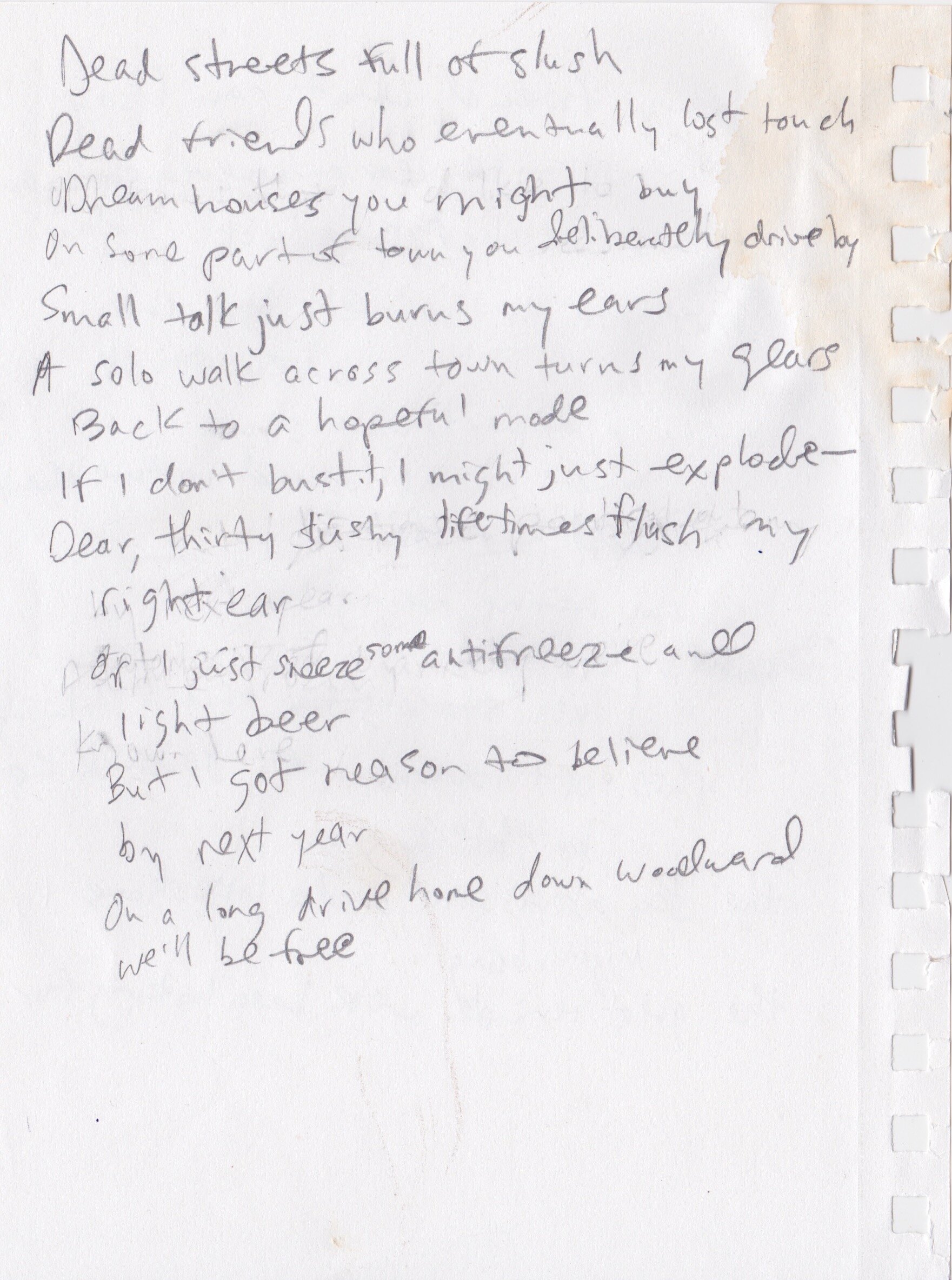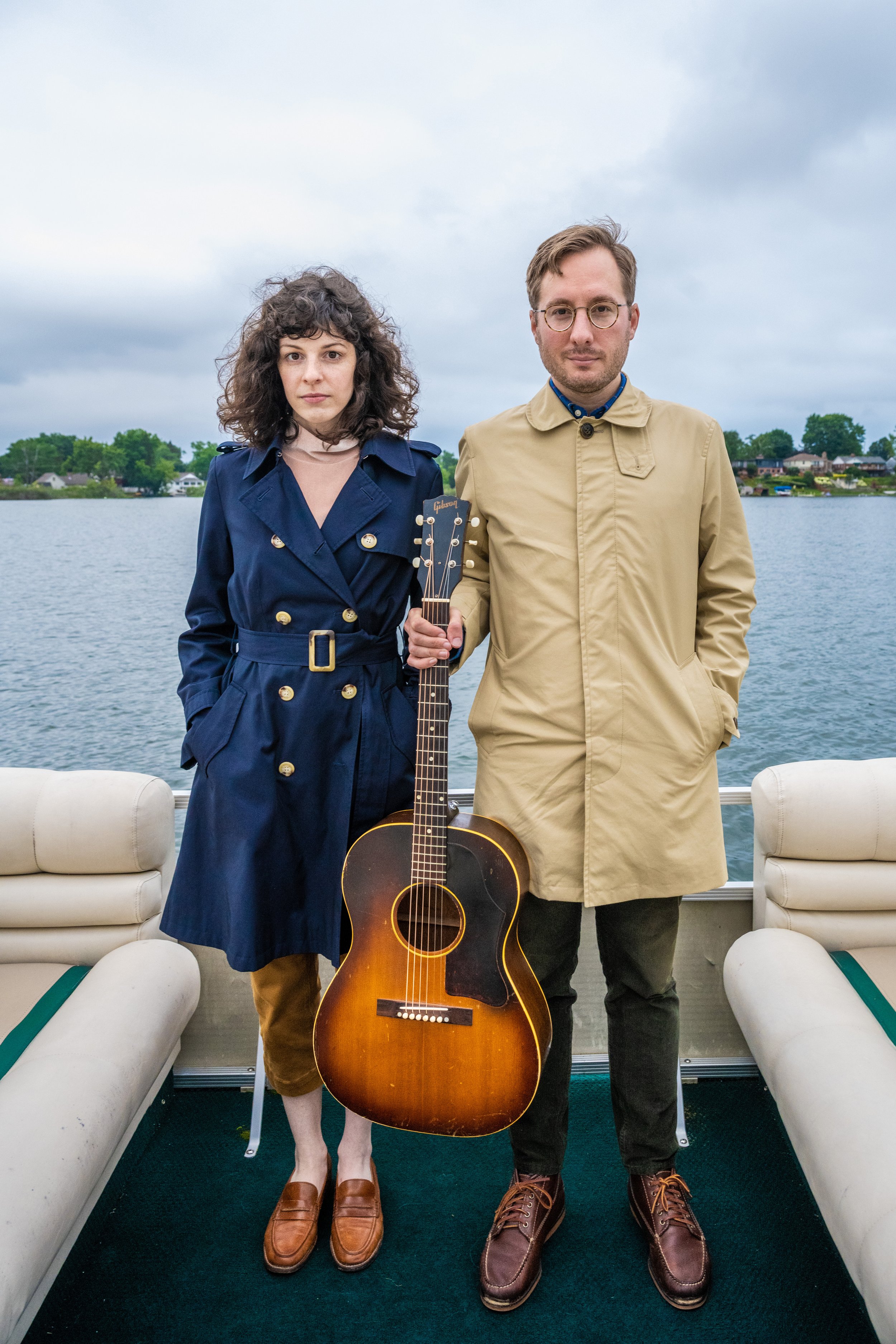Local Spins visited Matthew in Detroit for a day last spring, and these amazing portraits by Loren Johnson were the result. Check out the accompanying interview with Enrique Olmos here.
Thank you, Hour Detroit Magazine for this super generous piece! We met up to chat at Harbor Steakhouse in Keego Harbor before they opened for the day—the same bar where, as a boy, my parents coaxed me to approach Bob Seger for his autograph.
•
“The unofficial musical poet laureate of Detroit’s suburbs” is probably my favorite thing ever written about me. Also, my dog Woody thinks he’s famous now.
Matthew was a recent guest on the Origin Story podcast to talk about keeping the creative process alive through all of life’s topsy-turvy stages!
Check it out HERE.
Amazing Keego Harbor-inspired embroidery by Oh My Golly Embroidery in the UK!
Matthew Milia is this week's guest on Acoustic Cafe
Matthew’s interview & full-band performance for Acoustic Cafe is hitting airwaves nationwide this week. You can also stream it here!
The Keego Harbor 2xLP is finally here! All pre-orders should by now have been received. Thanks so much for your patience! Order now to receive in time for that special someone by Christmas—HERE.
Limited edition includes:
- 2 Dairy Queen cherry-red LPs
- Lyric insert
- hand-signed/numbered DL card
- hand-stamped/typed envelope
- Keego Harbor sticker designed by Motown Sign Co.
- 3x5 glossy
- Credits
Made in Detroit at Archer Record Pressing.
Album photography by John Mark Hanson. Art layout by Sara Showers.
Thanks to the Columbia Daily Tribune in Missouri for including Keego Harbor in their Best Of 2021 & these amazingly kind words!
Thanks to Spain’s national radio station for spinning Keego Harbor! Really cool playlist here.
Nothing/everything is possible in Keego Harbor.
Most people feel some type of way about their hometown. Some couldn't wait to escape the clutches of familiarity and feelings of being forever stuck fast enough, while others never dared to dream big enough to leave and, instead, planted roots on top of roots next to abandoned video rental stores casting shadows of inevitable emptiness on places where roots had previously been laid and paved over.
For singer-songwriter Matthew Milia, Keego Harbor is more than a hometown, it's a muse. Keego Harbor is, as Milia says, "one of the more interesting parts of Oakland County." He describes it as being where "the meticulously manicured suburban veneer" has eroded, where there are beautiful lake homes and also "people in cut-off shorts on Jet-Skis" only to reveal a place "where the brink of luxury meets the stink of drudgery," as referenced in his latest single, "Keego Harbor" off of the Frontier Ruckus frontman's second solo record of the same name, which came out this summer.
"It's like Raymond Carver short story, where it's the people that are living lives of not so quiet desperation," Milia tells Metro Times. "Those aren't the stories of pure success or triumph. It's a little bit of the other side of the coin," he says. "Falling short is one of the most beautiful human emotions to me, and it's towns like Keego Harbor that are oozing with that."
Milia prefers to write from a local lens and says his fascination, or as he refers to it, a bit of an obsession, with Keego Harbor and his never-ending journey to excavate his memories is not meant to separate himself from those who live and haunt his hometown, the place where his parents met and still own a home. In fact, the song starts off with Milia making a confession: "Someday I think I'll move back to Keego Harbor."
"It's like, I understand the succumbing to a natural source of comfort, as unhealthy as it might be," he says, saying he finds himself often entranced by the beauty and pathos of Instagram accounts and stories of people that he grew up with, who have never left. "It's something internal, like, we are bound to the places that we come from. It's like you're innately tuned to the frequency there, even if you don't want to admit it."
The track's highly nostalgic and appropriately autumnal companion video, directed by Noah Elliott Morrison, is described by Milia as a "haunted scavenger hunt" through time, memory, forgotten ambition, shuttered Dairy Queens, and old sub shops where Milia's friend used to work, and where they watched the tragic events of 9/11 unfold. The video is almost like an UnPure Michigan advert, though honest and unflinching in its portrayal of a town that could easily be a stand-in for a number of small towns across the country that have been ravaged by change and, in some ways, the lack of change.
The beautifully overcast video, edited by Matthew Hallowell and colored by Samuel Mikalonis, captures the muted banality of day-to-day life which was made all the more personal thanks to Milia and Morrison's manufactured moments and objects around Keego Harbor to act as memory triggers or personal Easter Eggs. For instance, there's a croquet set featured which is something Milia's mom (who has starred in some of his videos in the past) won in a silent auction at St. Hugo, the school which Milia attended and the namesake of his debut solo record.
"Maybe I would get a shift, working at that all-night gift shop at the hospital/ Where the brink of luxury/ Meets the stink of drudgery," Milia wistfully dreams in one of the songs many anti-fantasy fantasies. Milia selected the hospital gift shop because he says he spent many nights at St. Joseph Mercy hospital as an asthmatic child.
While Milia's Keego Harbor love letter/cautionary tale may do little to boost tourism, though you never know, what it does is invite listeners to reflect on where they came from and how these forgotten spaces, places, and shuttered storefronts that, like, reopen with a new business nestled inside but never purchase proper signage so there's this banner that was supposed to be temporary and celebratory but eventually fades and droops until a new place moves in — or doesn't — are reflections of our own bleak ambition and unmet expectations.
"We kind of just wanted to let the landscapes do the talking, because they're kind of the stars of the record and of that song," he says. "Because I'm not just interested in how people like myself or my family change with time, but the lifetimes of the spaces themselves that we build and occupied and how they appear permanent, but they're actually glacially shifting or dissolving into, the dreams and promise of a certain strip mall Plaza," Milia details. "I think like these places that are featured in the video, I remember their grand openings.I remember the heyday of these strip malls and 20 years later, the inevitable stagnation that they all reach."
When filming, Milia recalls several takes in which he had to cross the street into the parking lot of a boarded-up Dairy Queen. Something that would turn few heads in Detroit, where he and his wife live, but turned many in Keego Harbor and, appropriately, one encounter with a local seemed to sum up the very spirit of the song and Milia's own journey backward.
"A guy came out of his basement apartment smoking cigarettes and he's like 'Hey, are you famous or something?' to which Milia replied, "No, not really, no."
Releasing something exciting this week!
Images by Noah Elliott Morrison
"One of the great American songwriters working today."
Really lovely ★★★★ review from The Morning Star in the UK!
Live performance for Bird Fight sessions!
Pete Ballard - pedal steel
Ben Collins - bass guitar
Connor Dodson - drums
Lauren Milia - vocals
Audio - John Katona, Tom Mihalis
Video - Christian Ohly, Anna Pilarski
Matthew chatted with NPR/Michigan Radio’s Stateside program about his new album Keego Harbor.
Thanks for the kind words, JamBase!
Photo by John Hanson
KEEGO HARBOR IS OUT TODAY!
It’s out! I put everything I’ve got into Keego Harbor, and now it’s yours to do with it what you will. I hope it’ll find a place in your heart and that my meditations on family, love, age, and the complex identity of “home” will resonate with that of your own. Please share it far and wide if you happen to enjoy! And thanks for listening.
Songwriter Matt Milia reminisces about Detroit suburbia on solo record ‘Keego Harbor’
by Doug Coombe
Frontier Ruckus frontman Matthew Milia’s songwriting subjects are Pure Michigan. Yet they’re also the last place the Pure Michigan ad campaign would visit. Shrinking towns and dying malls don’t make for tourist-tempting sweeping camera shots. They are the stuff of great stories, though.
Case in point: Keego Harbor. It’s the title of his second solo album, out Friday. Keego Harbor has the distinction of being the third-smallest city in Michigan. The fourth-smallest city is Sylvan Lake, which borders Keego Harbor on the east. It’s where he grew up. It’s where his parents met.
Keego Harbor is also nestled in between one of Michigan’s wealthiest communities (Bloomfield Hills) and a community gutted by the shuttering of American auto manufacturing (Pontiac). Keego Harbor and Sylvan Lake were unique for being a small blue-collar enclave where the dream of a modest home and weekends on the lake existed. Mom-and-pop businesses lined Orchard Lake Road on the south end of town.
Today Orchard Lake Road is mostly populated by strip malls. There are plans to replace the trailer park on Cass Lake with luxury apartments. The homes on Sylvan Lakes these days are much more upscale. To borrow the title of the very Teenage Fanclub-esque song from his new album, it’s turning into a “Condo Lakeshore.”
It’s America in a nutshell, and the perfect bittersweet starting point for Milia’s songwriting. Milia is a freakishly eloquent, honest, and vivid storyteller. His songs are all a small journey unto themselves. One of the great treats of Milia’s songwriting is his delight in conjuring up unlikely rhymes to humorously and poignantly paint a picture.
Take “Me and My Sweetheart” from the new album: “Me and my sweetheart unstoppable/ we were born in the same hospital/ about four years apart/ brought back to modest homes/ in the shadows of the soccer domes/ our mothers clung to cordless phones/ as the summers all began to drone by.”
Milia recorded the new album during the pandemic at the Ypsilanti studio of Ben Collins, a formidable songwriter and guitarist in his own right as the frontman of the shoegaze band Minihorse. But he’s also a brilliant producer and collaborator, joining Milia on drums, bass, and vocals on the album.
Collins’ skill at multi-tracking vocals is a highlight of the record. Milia’s wife, Lauren, joins him on vocals, and the pairing is pop perfection. The other great highlight of the record is the virtuoso cosmic country steel guitar playing of the Scrappers’ Pete Ballard. The sound of his playing is the embodiment of late-night drives amid the ghosts of Detroit’s manufacturing heyday. Frontier Ruckus collaborator Ryan Hay rounds out the recording on piano, channeling his best Nicky Hopkins on the title track.
Milia and I both spent our youth in Sylvan Lake, though decades apart. We met up for a long-discussed pontoon boat ride with his wife and his childhood friends Erik and Alaina. We took photos, told tales of teenage shenanigans, and Matt and Lauren sang a song as we drifted on the lake. Did I mention that Matt’s guitar (like most of them) is a made-in-Michigan Gibson? Meanwhile, I chugged a Faygo Red Pop in honor of my 13-year-old self.
Metro Times talked to Milia via email about his new album. (What we talked about on Sylvan Lake stays at Sylvan Lake.)
Metro Times: Why a solo album instead of a Frontier Ruckus album? When you write a song, do you immediately tend to think of them as a solo song or a Frontier Ruckus song?
Matthew Milia: I simply write too many songs. And they all start with the exact same motivation — to process my world and my memory into something that feels a bit more manageable, that I have a bit more agency over. But they tend to end up in a few different stylistic buckets. The past few years I’ve reserved the ones that have felt like hyper-personal memory collages for solo use and slated the ones with more of a universal gravitas for Frontier Ruckus.
MT: Are your solo albums kind of a pop side project?
Milia: Around 2013 when I moved to Hamtramck, I inexplicably moved a bit away from folk and fell in love with power-pop — the pure melodic focus and more direct lyrical style, though it hasn’t really made me write less words! But poppy harmonies and hooks. Tambourine and 12-string jangle. I feel more comfortable going there solo than shoehorning Frontier Ruckus in that direction, which obviously has a very established musical identity that I cherish too much to tamper with.
MT: Even though your solo work and Frontier Ruckus are sonically very different, the bands have a similar makeup. You're backed up by an instrumental prodigy as your foil (David Jones on banjo with Frontier Ruckus, Pete Ballard on steel guitar with your solo album) with a multi-instrumental genius providing all the interesting textures (Zachary Nichols with Frontier Ruckus, Ben Collins with your solo work). Is that a happy accident or by design?
Milia: My songs are so dense with lyrics that, in the brief moments in which I’m not spewing imagery, I like to reward the listener with dulcet, virtuosic musicianship. Those guys all fit the bill!
MT: What was it like recording during the pandemic?
Milia: I owe it all to Ben Collins. I’m so fortunate that in one little room in Ypsilanti, Ben has a tape machine, a drum kit, and most of all, his brilliant musical mind and technical prowess to afford me this creative outlet. Lots of Walgreens COVID tests. But we got it done.
MT: I think Ben Collins is easily one of the best producers in Michigan. What do you enjoy most about recording with him?
Milia: We arrange songs together almost telepathically. He can shred like SRV, with the computational skills of Carl Sagan. He’s just such a good musician and technician — both sides of the brain. And he’s patient with me, and we laugh a whole lot.
MT: I hear a lot of Big Star, Teenage Fanclub, All Things Must Pass, and the first Flying Burrito Brothers album — what other inspirations am I missing?
Milia: I definitely didn’t want to shy away from a country-pop sound this time around, recruiting Pete Ballard, a Detroit steel guitarist that I’ve idolized for over a decade. His steel lines make the album for me. And my old friend Ryan Hay on piano. So yeah, it’s got a bit of Gene Clark, Michael Nesmith, even Judee Sill going on. But I was also listening to a lot of Randy Newman and XTC.
MT: In what ways is this a marriage record?
Milia: It’s such a marriage record! Lauren and I were married a few weeks before the world shut down. With the honeymoon canceled, obsessing over these songs became my means of staving off that insanity everyone felt closing in. That’s why so many of the songs celebrate the redemptive power of love in unpredictable times. Friends have commented that these are my first proper “love songs.” And Lauren’s voice on the record is really the element that breaks my heart in the best way and represents such completeness.
“Milia’s wife Lauren joins him on vocals, and the pairing is pop perfection.” Photo by Doug Coombe
MT: Has having “a real job” changed your writing much?
Milia: Apart from using Keego Harbor as a sort of existential metaphor, I think the album works on another level as commentary about my own professional misgivings — coming to an end of a decade as a touring musician and prolific songwriter and wondering where it’d gotten me. Finding myself in an unrecognizable musical landscape. Somehow teleported into a career where I’m writing national car ads and weirdly excelling at it. “Someday I think I’ll move back to Keego Harbor” almost became an anthem of recalibrating one’s expectations and finding joy in the very simple basics of life once again. Realizing that what you were chasing so steadfastly wasn’t the thing that was going to make you happy. That it was never “show business” that really appealed to me. It was the simple act of writing songs about my odd local world.
MT: Would you really move back to Keego Harbor? You seem pretty rooted in Detroit these days.
Milia: A part of me would like to move back there, to walk in a daze through Dollar General parking lots at dusk feeling a faint poetic sense of belonging, but I’m not sure it’s the part of me that should be indulged. Detroit offers me a healthier grasp on reality.
MT: There is a strong sense of nostalgia for Keego Harbor and Sylvan Lake on the record that really resonates with me, having spent my teenage summers there. What is it about the area that you love so much?
Milia: My parents met at a bar in Keego Harbor called The Back Seat Saloon that existed in the ’80s. So the record uses Keego Harbor to talk about generational themes. All the good and not-so-good kinds of emotional inheritance. Keego Harbor just happens to be the specific location that houses my memory. So I glorify the lakes and the wave runners. The Dairy Queen and the trailer park. I can take any aspect along Orchard Lake Road and mythologize it in verse. But the beautiful thing is that everyone has those specifics. And they can hopefully do a bit of translation to arrive at more universal notions of hope and fear, love and frustration.
MT: That line, “In Keego Harbor it’s all possible,” from the title track hit me pretty hard. For me, that seems like more of a wish or the recollection of a young person’s idealism. Agree or disagree? Keego Harbor to me seems like an example of the slow death of the American blue-collar dream.
Milia: Yes, I think you’re supposed to feel a bit of pathos in that line. Like the speaker (me) is almost trying to convince himself of a hopeful outcome more than the audience. Keego Harbor is in many ways a suburban no-man’s land caught between Bloomfield’s affluence and Pontiac’s abandonment. But that tension is what gives it psychological interest to me. People see Detroit’s northern suburbs as this monolithic culture (or lack thereof). But it’s actually a fertile land rich with complex humanity, tragic storylines, and late-capitalist malaise. The mingling heaviness and beauty and crushing empathy of it all have long been my main creative thrust.
MT: Your songs celebrate the beauty in seemingly mundane everyday things. Who are some writers and songwriters who inspire you in that way?
Milia: Filmmakers like Terrence Malick or David Lynch who can make a sidewalk feel like a cosmos. I see novels like Winesburg, Ohio by Sherwood Anderson as a paragon of elevating small-town banality to a spiritual realm. Jonathan Richman.
MT: Tell me about the handmade lyric book for Keego Harbor you’re selling. Do you have any future book plans or dreams?
Milia: I just like offering something handmade as part of a release. It’s become part of my M.O. that fans seem to appreciate. A simple handwritten lyric booklet with a sewn binding and photo prints of 35mm shots I’ve taken around Keego. What I really want to pursue is a large coffee-table book of lyrics to my 120+ songs. But I won’t be writing that out by hand!
MT: Any future Frontier Ruckus plans? Future solo show plans?
Milia: We also managed to record the sixth Frontier Ruckus album during the pandemic with Ben Collins. I think it’s one of our strongest albums. I sort of see it as a return to The Orion Songbook’s rawness. The sound of people playing together in a room, bleed and all. David’s banjo playing and Zach’s horn parts are also on a whole new level.
When the Keego Harbor vinyl and CDs arrive, we’ll schedule an album-release show!
Keego Harbor is out Friday on all streaming platforms. You can order it on vinyl or CD at matthewmilia.com.
Detroit Metro Times interview HERE.
Photo by Doug Coombe
Matthew Milia goes home again with ‘Keego Harbor’
Photo by Noah Elliott Morrison
Keego Harbor became a saving grace, both literally and figuratively, for Matthew Milia during the pandemic.
For the singer, songwriter, multi-instrumentalist and co-founder of the group Frontier Ruckus, “Keego Harbor” — Milia’s second solo album, out Friday, July 16 — carries a sense of place that grounds its 10 songs in memories of his hometown and the metro area, with specific references to a favorite Dairy Queen, the Franklin Cider Mill, traffic at Detroit Lions game, the now-gone Back Seat Saloon, where his parents met, and Tim Allen’s “Home Improvement” sitcom.
“I used that very specific locality as a venue to talk about the generational fear and existential threat, things you inherit — timeless themes,” says Milia, 35, a Brother Rice High School graduate who now resides in Detroit and also works as a copywriter for the Doner advertising agency.
Milia adds that his “obsession with specificity” is something that’s become more prevalent over the years, both on his own and with the band.
“I think when Frontier Ruckus started touring constantly, my world started getting bigger and bigger, and that was overwhelming,” he explains. “So when the time came to write a song, my lens kept getting more and more local. I would obsess over things I was familiar with to feel like I had some sense of agency and some control over this chaotic world.”
During the pandemic, he says, that became “a kind of existential crutch — there was a real sense of comfort for me to sing about things I know and feel like I have some understanding of.”
Milia recorded “Keego Harbor” at co-producer Ben Collins’ studio in Ypsilanti, with his wife, Lauren Milia, also providing vocals and Pete Ballard’s pedal steel adding a greater Americana flavor to Milia’s rich pop melodies.
“The songs are really all about love and the rejuvenating power of it. It’s very gratifying,” says Milia, who was married in February 2020 but only recently honeymooned in Mexico City.
Milia, who filmed a video for the title track, is waiting to schedule a concert for the album until after physical copies are available later this summer. Meanwhile he and Frontier Ruckus have recorded their sixth album, which the band expects to release in early 2022.
The group performs Saturday, July 17, as part of the Dam Jam in Old Town Lansing. Visit lansing501.com for details.
